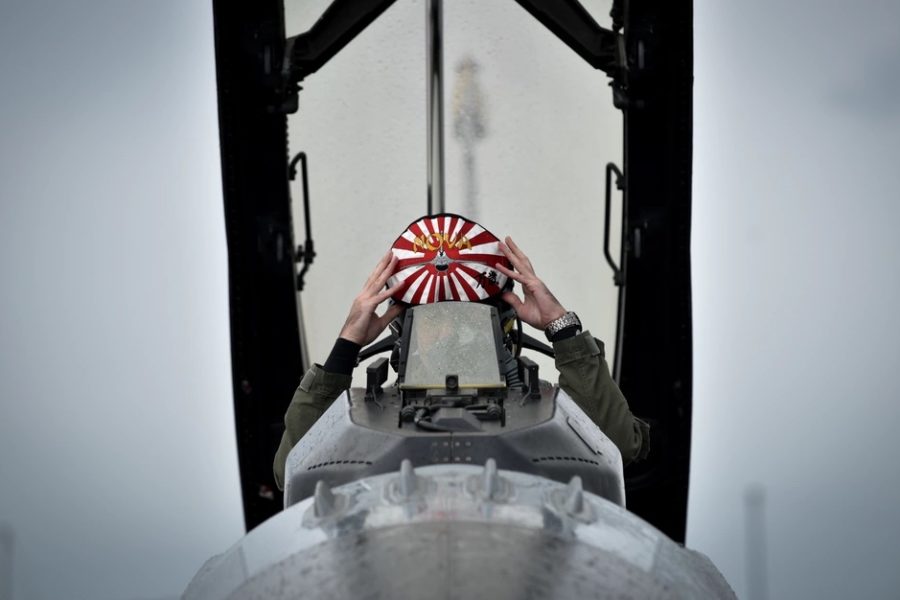U.S. military pilots avoid health care or misrepresent and withhold health information from their flight surgeon at greater rates than civilian pilots out of fear they might lose their flying status, according to a new study conducted by Air Force and civilian medical experts.
Though the population size of 264 military pilots surveyed was relatively small, the study marks one of the first attempts to scientifically analyze the widely-held belief that military pilots avoid health care, particularly mental health care, out of fear that certain medical conditions will take them off flight status.
“To our knowledge, the current effort appears among the largest studying U.S. military pilot health care avoidance behavior because of fear for loss of flying status,” the authors of the study, a mix of Air Force and civilian doctors, wrote. The study, funded by the Air Force, was first published in October and was included in the March-April 2023 issue of the journal Military Medicine.
The study found that out of 264 military pilots, 190 (72 percent) reported a history of health care avoidance, 111 (42.5 percent) misrepresented or withheld information on a written health care questionnaire, 89 (33.7 percent) flew despite experiencing a new physical or psychological symptom that they felt probably should be evaluated by a physician, and 30 (11.4 percent) reported a history of undisclosed prescription medical use.
Continuing to fly without reporting concerning medical symptoms “is overtly against regulations for U.S. military pilots because of aviation safety concerns and increased health risks to the pilot,” the study authors noted. “These data speak to the risk (both aviation safety and individual health-related) certain military pilots may willingly tolerate to avoid health care because of fear of losing their flying status.”
Military pilots in particular appear to fear losing their flight status more than their civilian counterparts. More than 4,000 civilian pilots were also surveyed as part of the study—66 percent of paid civilian pilots reported at least one type of health care avoidance behavior, and that figure dropped to just 44 percent for non-paid civilian pilots, who might fly only recreationally.
About 15 percent of civilian pilots reported flying despite experiencing a new physical or psychological symptom they felt should be evaluated by a doctor, about half the rate at which military pilots reported such behavior.
The study authors suggested the difference in reported behaviors between military and civilian pilots could be due to factors unique to the military aeromedical system or military aviation, or because of a higher representation of younger pilots in the military who are just starting their careers.
The study builds on previous academic work suggesting that pilots avoid health care. A 2019 study of 613 U.S. airline, recreational and military pilots found 78.6 percent of participants were worried about seeking medical care because of how it would impact their ability to fly. Another study in the same year of 173 Active Duty and Reserve Air Force pilots showed only 44.1 percent of pilots felt comfortable discussing a major medical concern with a flight surgeon, and 74 percent felt the need to withhold major, potentially disqualifying, medical information from flight surgeons.
Withholding medical information is not exclusive to military or civilian pilots. A 2019 study of 843 adults found that participants avoided disclosing personal health risk information significantly more “when they believed that a powerful audience (an employer or insurance company) might learn their results from a health risk test than when they believed a non-powerful audience (health researchers) might learn their results,” the authors wrote.
And service members in general may also avoid seeking health care, and mental health care in particular, out of fear it might impact their career, studies have found.
In response to this most recent study, Army medical provider Albert Lee wrote an essay calling for greater trust between military pilots and flight surgeons.
“Being grounded impacts one’s career progression, unit and personal morale, and possibly one’s financial situation,” Lee wrote. “For such reasons, the anxiety associated with annual physicals is somewhat understandable.”
To bridge the gap, Lee suggested that flight surgeons should fly with pilots more or spend more time in general with them in order to build trusting relationships.
“When you fly regularly with the pilots, they will start recognizing you as part of the flying team, not an adversary who is looking to medically ground them,” he said. “You can have some shared occupational identity with them, which can enhance the trust relationship.”
Flight surgeons can urge pilots to treat their bodies the same way they would an aircraft, Lee suggested: If there is a serious issue that could put lives at risk or end the mission, don’t fly with it. Providing more information about the necessity of the medical process and the nature and treatment timeline of a possible medical condition could also help lower pilots’ stress and anxiety.
Though the new study marks one of the broadest efforts yet to understand the issue, the authors wrote that more data could lead to more fine-grained analyses of the problem. The authors also noted the survey responses were collected anonymously online, and thus are unverifiable, and the survey did not ask participants to disclose their branch of service or whether they have sought informal medical care outside the military health care system.
There may also be differences in the rate of health care avoidance based on age, gender, or type of aircraft, but the sample size may have been too small to study those differences, the authors noted, and the study also did not include pilots of unmanned aerial vehicles or other flight crew such as navigators.
